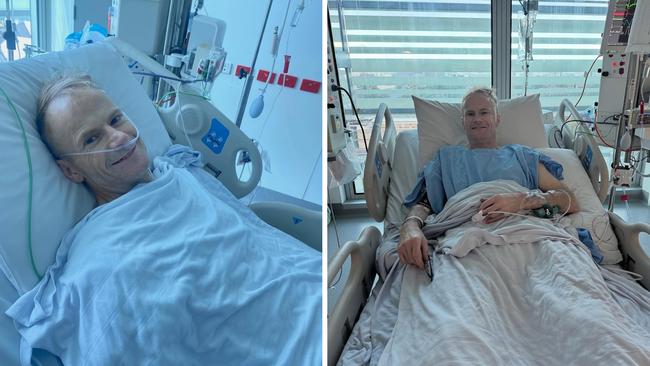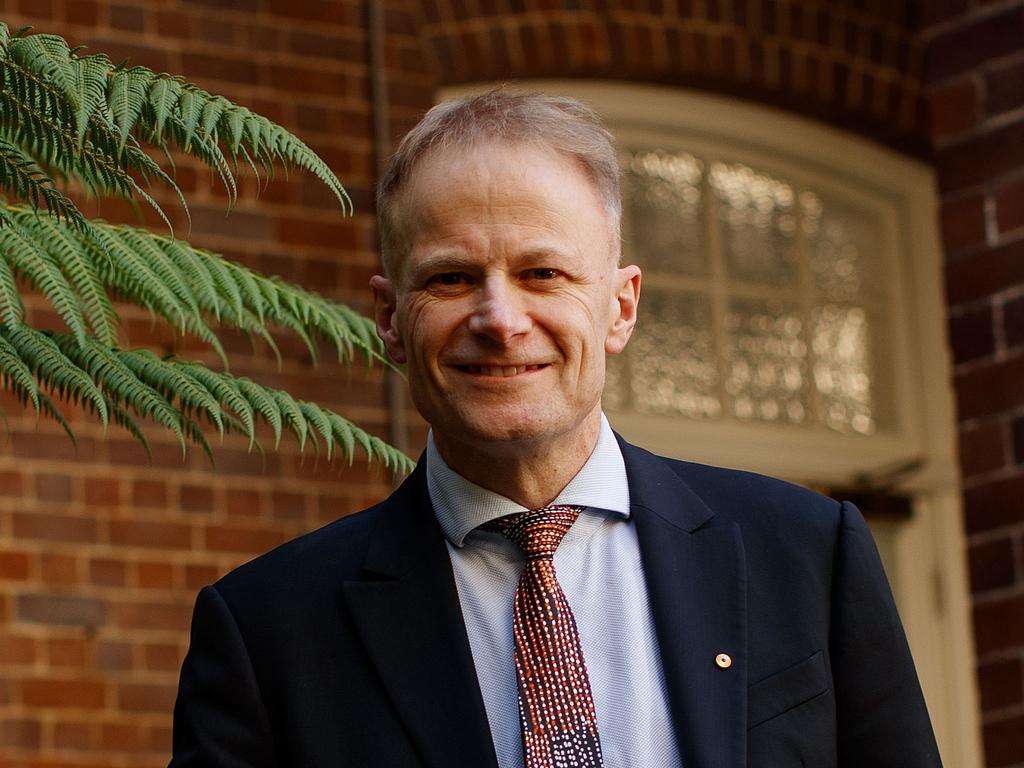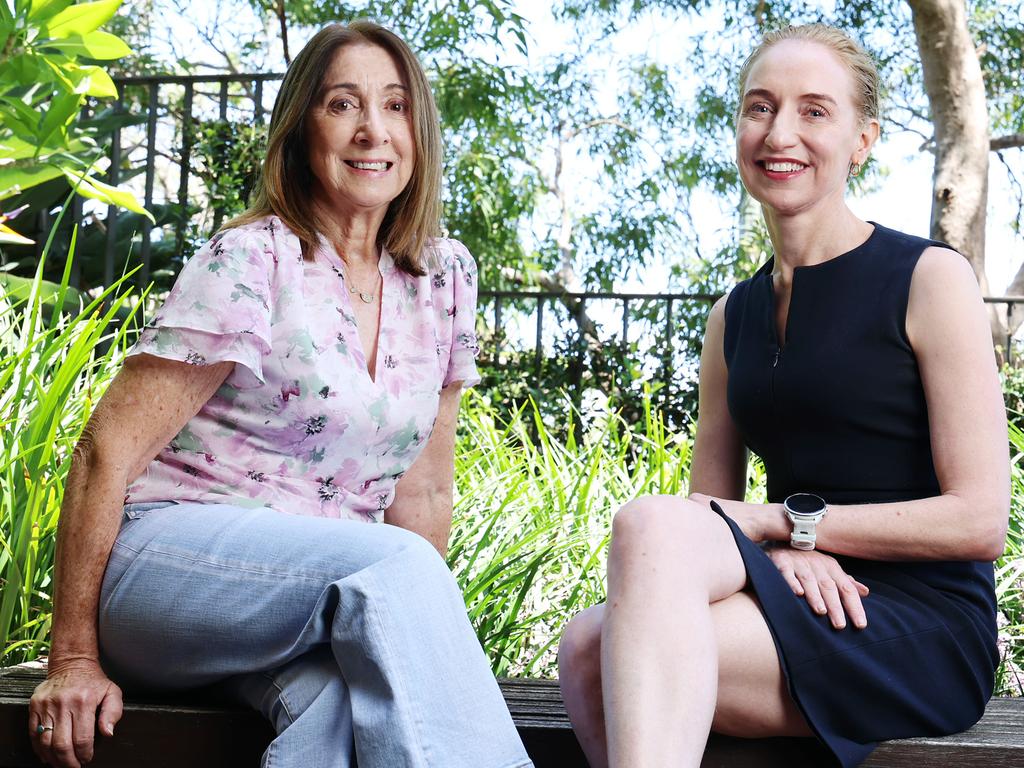Renowned melanoma scientist Richard Scolyer provides update from hospital bed
Renowned melanoma scientist Richard Scolyer is focused on recovery after complex surgery to determine the cause of brain scan ‘changes’.

Renowned scientist Richard Scolyer smiles from his hospital bed, in a post on social media, to reassure supporters he is in recovery following complex exploratory surgery to determine the cause of “abnormalities” detected on his brain.
The former Australian of the Year underwent the surgery on Monday, though he has not yet shared the results.
“Thankyou to everyone for your kind thoughts and well wishes,” he wrote on Instagram on Tuesday. “I have undergone what is a complex surgery and am incredibly grateful to my medical team at Chris O’Brien Lifehouse for their exceptional care and support, particularly (associate professor) Brindha Shivalingam. I would also like to express my heartfelt thanks to my family and friends for their unconditional love and unwavering support throughout this journey. Now I am focused on my recovery and will share more updates when I am able. Thankyou in advance for your patience and understanding.”
On Monday, federal Health Minister Mark Butler sent his support. “Professor Scolyer is a fighter and I wish him all the best in his ongoing treatment,” Mr Butler said.
Professor Scolyer, a world-leading pathologist specialising in the diagnosis of melanoma, was diagnosed with grade 4 glioblastoma in June 2023.
Glioblastoma is one of the most complex, deadly, and treatment-resistant cancers. Patients have an average survival of 12 to 18 months and, according to The Brain Cancer Centre in Melbourne, only 25 per cent of patients survive more than one year and fewer than 5 per cent survive more than three years.
The standard treatment for the cancer is delicate brain surgery to remove as much of the tumour as possible, followed by radiation and chemotherapy. Following his diagnosis, Professor Scolyer decided to test a cutting-edge experimental immunotherapy, pioneered by his colleague and fellow Australian cancer specialist Professor Georgina Long, on himself.
In the first instance a biopsy was taken from his brain, and the tissue tested to allow development of a personalised “vaccine” against the cancer cells. It works by activating the immune system and instructing T-cells to kill tumour cells and was given to him prior to his original surgery.
Follow-up testing of the tumour tissues showed promising changes with signs that the vaccine was attacking the malignant cells, raising hopes about the fresh approach to the brain cancer treatment. Until recently, further scans had not shown any abnormalities.
“Unfortunately, my recent scans show some new changes which could be an effect of my previous treatment or recurrent brain tumour,” Professor Scolyer foreshadowed on Instagram in February. “I might need surgery in a few weeks time to obtain some tissue so the smart neuropathology team can help to figure this out.”
Just days ago, he confirmed the surgery would go ahead “to help the brilliant team looking after me try and sort out the nature of the changes in my brain detected on various recent scans”.
In 2024, Professors Scolyer and Long were jointly named Australians of the Year in recognition of the thousands of lives the pair had saved as a result of their innovative work. They were co-medical directors of Melanoma Institute Australia and pioneered new treatments for melanoma using immunotherapy. The award further helped to lift their public profiles and that of their research.
Whatever the outcome of Professor Scolyer’s latest surgery, his progress to date has been remarkable, so too his work in this field. By this stage of traditional treatment, the majority of patients would have suffered recurrence of their brain tumour.
Details of Professor Scolyer’s experimental treatment have been published in the latest edition of the peer-reviewed medical journal Nature Medicine. It is the first documented use of neoadjuvant triple immunotherapy in glioblastoma and now paves the way for a crucial clinical trial to take place.
The Australian-led international trial will be run by the Brain Cancer Centre and will examine the efficacy of using double immunotherapy in patients with glioblastoma. It is hoped that for some study participants, the treatment will be combined with chemotherapy.
“I am delighted to be handing the baton to Dr Jim Whittle, a leading Australian neuro-oncologist at Peter MacCallum Cancer Centre, The Royal Melbourne Hospital and co-head of research strategy at the Brain Cancer Centre, to commence a broader scientific study to scientifically determine if – and how – this process might work in treating glioblastoma,” Professor Long said.
“While we are buoyed by the results of this experimental treatment so far, a clinical trial in a large group of patients would need to happen before anyone could consider it a possible breakthrough.”
It is hoped the trial could begin within 12 months.
“I want patients and their families to know that there is an army of people out there working incredibly hard to develop new treatments for patients with brain cancer,” Dr Whittle said. “There has never been more attention, focus and research in this field, which has led to more availability of clinical trials.”




To join the conversation, please log in. Don't have an account? Register
Join the conversation, you are commenting as Logout